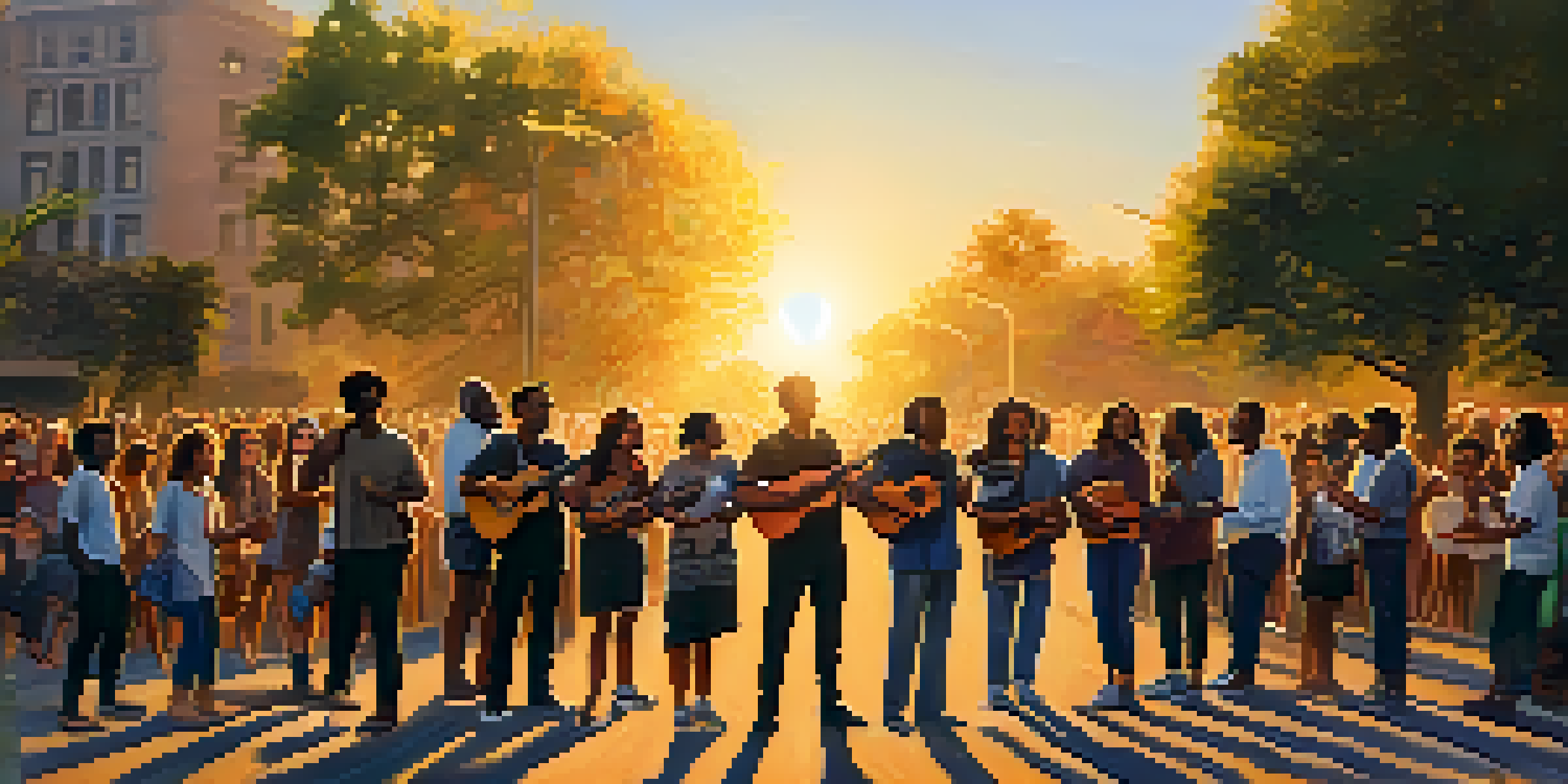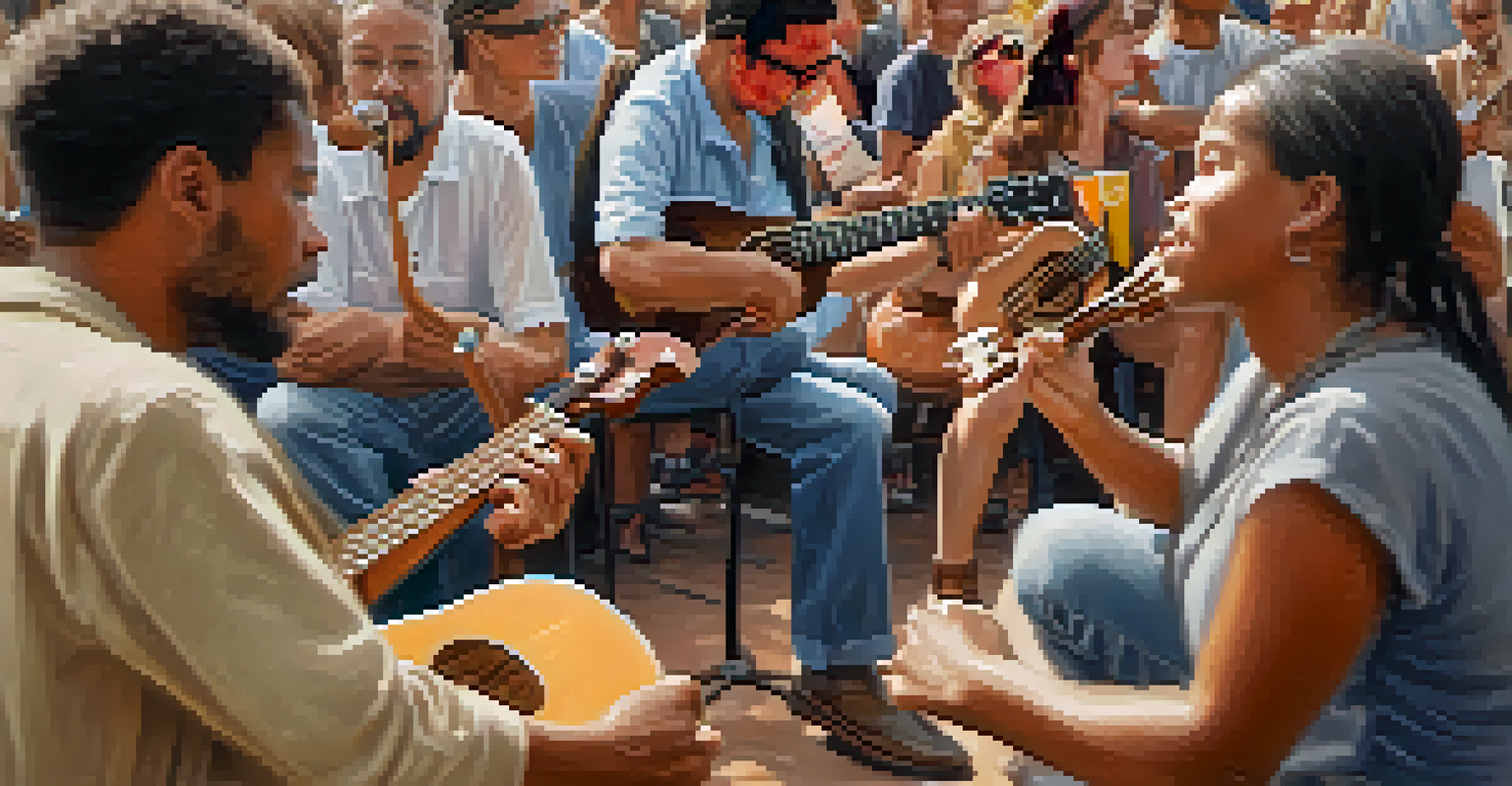The Ukulele's Surprising Role in Modern Protest Movements

The Ukulele: A Brief History and Its Rise
The ukulele, often seen as a cheerful and light-hearted instrument, has roots dating back to the 19th century in Hawaii. Initially, it was embraced for its simple, cheerful sound, making it popular in casual gatherings. However, over the years, it has evolved beyond its tropical origins, finding its way into various musical genres and cultures around the globe.
Music is the shorthand of emotion.
Its portability and ease of learning make the ukulele an appealing choice for many musicians, but its role has expanded significantly. Today, the instrument is often used in movements advocating for social change, resonating with those looking to express their messages in a non-threatening way. The ukulele's bright tones can lift spirits and foster a sense of community, essential elements in any protest.
From small gatherings to larger demonstrations, the ukulele serves as a unifying force, encouraging participation and collaboration. Its cultural significance has transformed from merely a musical instrument to a symbol of resilience and hope in modern protest movements.
Music as a Tool for Protest: The Power of Sound
Music has long been an integral part of protest movements, from the civil rights era to contemporary climate action. It provides a way to communicate ideas, evoke emotions, and rally supporters. The ukulele's unique sound can create an inviting atmosphere, breaking down barriers and bringing people together.

Unlike louder instruments, the soft and sweet sound of the ukulele can draw in a crowd, encouraging them to listen and engage rather than feel overwhelmed. This accessibility makes it an ideal tool for grassroots movements, where inclusivity is paramount. When people gather around a ukulele, they often feel more connected to the message and to each other.
Ukulele's Role in Protest Music
The ukulele serves as a powerful and accessible instrument in protests, fostering community and encouraging participation.
Additionally, songs played on the ukulele can be easily adapted to reflect the specific issues at hand, allowing for creative expression. Whether it’s a reimagined popular song or an original piece, the ukulele’s versatility empowers activists to craft their narratives in a way that resonates deeply with listeners.
Case Studies: Ukuleles in Action
One notable instance of the ukulele's role in protest is seen in the 2011 Occupy Wall Street movement. Participants used the instrument to play songs that addressed economic inequality, fostering a sense of camaraderie among the crowd. The soothing sounds of the ukulele provided a counterbalance to the often tense atmosphere of protests.
The power of music can bring people together in a way that few other things can.
Similarly, during the Women's March in 2017, ukulele groups performed empowering songs that highlighted women's rights and equality. This musical presence not only lifted the spirits of participants but also attracted attention from passersby, spreading the message further. The ukulele became a symbol of solidarity and empowerment, illustrating how music can amplify important issues.
These examples showcase how the ukulele can transform a simple gathering into a memorable movement. Through music, activists can create a shared experience that transcends individual differences, reminding us that we are all in this together.
The Appeal of Simplicity in Protest Music
One of the ukulele's greatest strengths is its simplicity. With just four strings, it is accessible for beginners, allowing anyone to pick it up and join in. This ease of learning promotes participation, making it a perfect instrument for community gatherings where everyone can contribute to the cause.
In contrast to more complex instruments, the ukulele encourages spontaneous music-making. This can be particularly effective in protest situations, where the mood can shift quickly. A catchy tune played on a ukulele can draw in a crowd, creating a sense of unity and shared purpose, even among those who may not consider themselves musicians.
Symbol of Hope and Unity
Its cheerful sound symbolizes hope, uplifting spirits and reinforcing the idea of collective action in the face of adversity.
The simplicity of the ukulele also lends itself to a wide range of musical styles, from folk to pop, making it adaptable for various movements. This versatility helps keep the message fresh and relatable, ensuring that it resonates with a diverse audience, which is crucial in any protest.
The Ukulele as a Symbol of Hope
In the world of activism, symbols play a powerful role in conveying messages. The ukulele has emerged as a symbol of hope and joy in the face of adversity. Its cheerful sound can uplift spirits, reminding protesters that positive change is possible, even amidst challenging circumstances.
When strummed in the midst of a protest, the ukulele can serve as a beacon of light, instilling a sense of optimism among participants. This is particularly important in movements that may seem daunting, as the ukulele's playful nature can help to relieve tension and foster a more positive atmosphere.
Moreover, the ukulele's association with community and togetherness reinforces the idea that collective action can lead to meaningful change. It reminds us that while the journey may be tough, we can find joy and strength in unity, making the ukulele a fitting companion in the fight for social justice.
The Future of the Ukulele in Activism
As social movements continue to evolve, so too does the role of the ukulele in activism. With the rise of social media, musicians can now share their protest songs with a global audience, spreading their messages far and wide. This connectivity can amplify the impact of the ukulele, allowing it to reach supporters who might not be physically present at protests.
In the coming years, we may see even more collaborations between activists and musicians utilizing the ukulele. These partnerships can harness the power of music to inspire action and foster solidarity, transcending geographical boundaries and cultural differences. The ukulele's unique voice can help bridge divides and unite people around common goals.
Future of Ukulele in Activism
As social movements evolve, the ukulele's role in activism is set to grow, leveraging social media to amplify messages globally.
Ultimately, the future of the ukulele in activism looks bright. As long as there are causes worth fighting for, this little instrument will likely continue to strum its way into the hearts and minds of those seeking change, proving that sometimes, the simplest tools can have the most profound impact.
Conclusion: The Ukulele as a Catalyst for Change
In conclusion, the ukulele has carved out a remarkable niche in modern protest movements. Its cheerful sound and accessibility make it a powerful tool for uniting people and amplifying their messages. Through music, activists can express their ideas, evoke emotions, and inspire action, transforming protests into vibrant expressions of hope.
The stories of the ukulele's role in various movements demonstrate its ability to bring people together, fostering connections that are vital for social change. As we look to the future, we can expect the ukulele to continue playing a significant role in the fight for justice and equality.

Ultimately, the ukulele reminds us that change can be achieved not only through words and actions but also through the universal language of music. In the hands of passionate advocates, this small instrument has the potential to create ripples of change that resonate far beyond the protest lines.